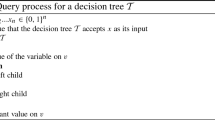Abstract
For ann-variable Boolean function, there are 2n fixed polarity Reed-Muller (FPRM) forms. In this paper, a frame of power dissipation, estimation for FPRM functions is presented and the polarity conversion is introduced to minimize the power for FPRM functions. Based on searching the best polarity for low power dissipation, an optimal algorithm is proposed and implemented in C. The algorithm is tested on seven single output functions from MCNC benchmark circuits. The experimental results are shown in this paper.
Similar content being viewed by others
References
Roy K, Prasad S C. Low-Power CMOS VLSI Circult Design. John Wiley & Sons, INC. USA, 2000.
Panda R, Najm F. Technology decomposition for lowpower synthesis. InIEEE Custom Integrated Circuits Conference, Santa Clara, California, USA, May 3–5, 1997, pp. 650–655.
Almaini A E A. Electronic Logic Systems. Third Edition, Prentice Hall, UK, 1994.
Reddy S. Easily testable realization for logic functions.IEEE Trans. Computers, 1972, (11): 1183–1188.
Mckenzie L. Logic synthesis and optimization using Reed-Muller expansions [Dissertation]. Napier University, 1995.
Wang L. Automated synthesis and optimization of multilevel logic circuits [Dissertation]. Napier University, 2000.
Brown S, Francis R, Vranesic Z G. File-Programmable Gate Arrays. Kluwer Academic Publisher, Boston, 1992.
Tsai C, Marek-Dadowska M. Multilevel logic synthesis for arithmetic functions.ACM/IEEE Design Automation Conference, Las Vegas, Nevada, USA, June 3–7, 1996, pp.68–73.
Zhou H, Wong D F. Optimal low power XOR gate decomposition.ACM/IEEE Design Automation Conference, Los Angeles, USA, June 5–9, 2000, pp.104–107.
Narayanan U, Liu C L. Low power logic systhesis for XOR based circuits.IEEE International Conference on Computer Aided Design, San Jose, USA, June 9–13, 1997, pp.570–574.
Sasao T, Fujita M. Representations of Discrete Functions. Kluwer Academic Publishers, USA, 1996.
Wang L, Almaini A E A. Fast conversion algorithm for very large Boolean functions.Electronics Letters, 2000, 36(16): 1370–1371.
Author information
Authors and Affiliations
Corresponding author
Additional information
This work is supported in part by the National Natural Science Foundation of China under Grant No. 60273093.
XIA YinShui received the B.S. degree in physics from Hangzhou University in 1984 and the M.S. degree in electronic engineering from Hangzhou University in 1991. Now he is a Ph.D. candidate in electronic engineering at Napier University. Prior to studying at Napier, he had been a visiting scholar at King's College London and worked as an associate professor and vice dean at the Department of Physics of the Ningbo University. His current research interests are in the area of computer-aided design of digital IC's, specially in the design of low power systems, algorithms for the automatic synthesis of low-power circuits. He has published over 30 papers in IEE proceedings, Electronics Letters, Journal of Electronics, etc.
WU XunWei graduated from Physics Department, Hangzhou University in 1962. Now he is a professor and the executive director of the School of Information Science and Engineering, Ningbo University, China. He is the author of the book entitled “Design Principles of Multiple-Valued Logic Circuits” and more than two hundred papers. Prof. Wu is a Senior Member of IEEE and the vice dean of MVL & FL Society, the China Computer Federation. His main research interests include multiple-valued logic circuit, digital circuits design at switch level, and low power digital circuits.
A. E. A. Almaini is a professor of Electronic Engineering and head of the Digital Techniques Research Group which he founded at Napier University in 1992. Since then he published three text books, Electronic Logic Systems (3rd ed.), and over 60 papers on various aspects of logic designs in IEEE and IEE journals. His research interests include the synthesis and optimisation of logic circuits, electronic computer aided design, error control coding and medical electronics. He refereed for IEEE Transaction on Computers, IEEE Transaction on Circuits & Systems, IEE Proceedings on Computers & Digital Techniques, IEE Proceedings on Circuits Devices and Systems, IEE Electronic Letters, Microprocessors and Microsystems, International Journal of Electronics and the Computer Journal. Dr. Almaini is a Fellow of the IEE and, at different times, served as member of the IEE Professional Group on Circuits & Systems, Chairman of the IEE Professional Group on Microelectronics and Semiconductor Devices and member of the IEE Electronics and Communication Division.
Rights and permissions
About this article
Cite this article
Xia, Y., Wu, X. & Almaini, A.E.A. Power minimization of FPRM functions based on polarity conversion. J. Comput. Sci. & Technol. 18, 325–331 (2003). https://doi.org/10.1007/BF02948902
Received:
Revised:
Issue Date:
DOI: https://doi.org/10.1007/BF02948902



